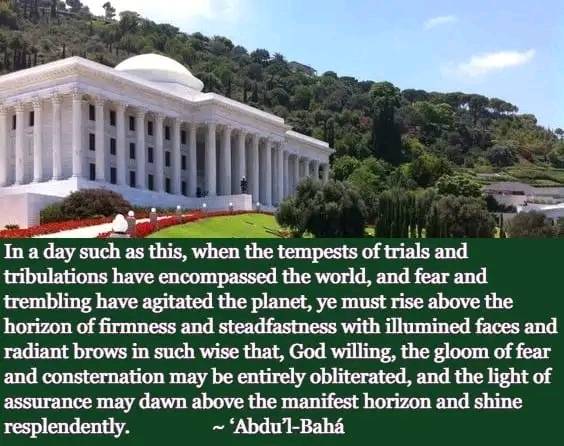Bahá’í World News Service
The official news source of the worldwide Bahá’í community
The BIC brought together member state representatives, UN agencies, and civil society to explore how women are uniquely situated to lead responses to the climate crisis.
BIC New York: Forum highlights women’s critical role in climate action
March 27, 2022
Share
Listen
BIC NEW YORK — The New York Office of the Bahá’í International Community (BIC) recently brought together representatives of member states, agencies of the United Nations (UN), civil society actors, and Bahá’í Offices of External Affairs from around the world to explore how women are uniquely situated to lead responses to the climate crisis.
Saphira Rameshfar, a representative of the BIC, explained that the forum focused on ideas presented in the recently published BIC statement “The Heart of Resilience: The Climate Crisis as a Catalyst for a Culture of Equality.”
“The gathering was intended to bring the concepts and themes of that statement to life. It allowed many social actors from around the world to learn from one another’s experiences in light of the ideas from the statement,” said Ms. Rameshfar.
Visit here to read the BIC statement titled “The Heart of Resilience: The Climate Crisis as a Catalyst for a Culture of Equality.”SLIDESHOW
4 images
Visit here to read the BIC statement titled “The Heart of Resilience: The Climate Crisis as a Catalyst for a Culture of Equality.”
A key point in the BIC statement and a main takeaway of the gathering is that, amidst mounting climate risks, humanity benefits when women’s leadership is embraced and promoted at every level of society.
Kate Wilson, representing the Permanent Mission of Saint Lucia to the UN, spoke about the critical need to include more women in decision-making spaces on the climate crisis because they are disproportionately affected and have had to become very resourceful in addressing local challenges.
“Women are the mothers of their nations. When their kids are hungry, they find ways to help them survive. Women are constantly looking for solutions,” she said, citing examples of women in the Caribbean who are seeking to reduce dependency on infrastructure that is often affected in times of natural disasters by promoting the adoption of technologies based on renewable energy sources.
Another participant, Iadalia Morales-Scimeca, of the Social Action Committee of the Bahá’ís of Puerto Rico, said that in recent years, women have been making significant contributions to sustainable farming in Puerto Rico, a country that imports 85% of its food. “One of the outcomes of the two hurricanes, the earthquakes, and the pandemic has been that we, as a national community, have realized how dependent we have been on food from the outside, even though our soil is quite fertile.”
She explained that this realization has prompted young people, especially women, to become involved in food production and the development of agricultural networks in order to increase the amount of locally produced food. “Even though everyone wanted to help us during the hurricanes, there was just no way to get food here, and we’ve just seen the same thing happening in Tonga.”
The Bahá’í International Community forum brought together representatives of member states, agencies of the United Nations (UN), and civil society actors from around the world to learn from one another’s experiences in light of the ideas from the BIC statement “The Heart of Resilience: The Climate Crisis as a Catalyst for a Culture of Equality.”SLIDESHOW
4 images
The Bahá’í International Community forum brought together representatives of member states, agencies of the United Nations (UN), and civil society actors from around the world to learn from one another’s experiences in light of the ideas from the BIC statement “The Heart of Resilience: The Climate Crisis as a Catalyst for a Culture of Equality.”
Ms. Rameshfar added that “action will be required on at least two fronts in order to ensure that the potential of women is fully harnessed: increasing women’s presence in leadership roles and creating conditions for women to engage more meaningfully in community life.”
Speaking about this theme, Saeeda Rizvi, of the NGO CSW Youth Leaders and Young Professionals, explained that deep-seated conceptions of leadership need to be revisited. “[Leadership] is currently very much rooted in the idea of what it means to be masculine,” she said. “In many ways, it is about what defines a strong leader versus a weak leader. Women’s strengths in being flexible and more empathetic need to be celebrated as qualities of a strong leader.”
Suzan Karaman of the Bahá’í Office of External Affairs in Turkey, referring to the BIC statement, highlighted some of the qualities typically associated with the feminine which are essential for leadership, such as “an inclination toward collaboration and inclusion, a disposition toward care and selflessness, the tendency to prioritize longer-term interests, and to consider the well-being of future generations.
The discussion forum was part of the BIC New York Office’s ongoing contribution to the discourse on the equality of women and men and held as a side event of the 66th session of the United Nations’ (UN) Commission on the Status of Women.




No comments yet
Be the first to share your thoughts!